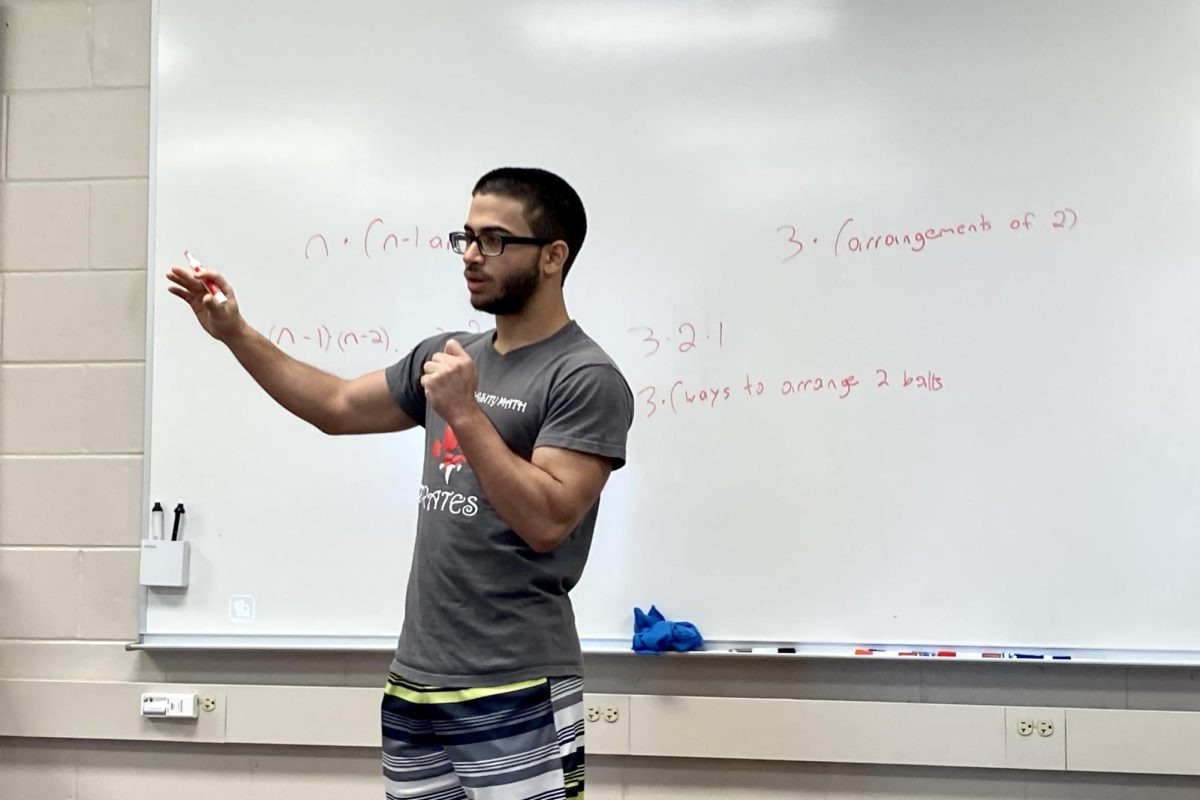The City High Math Club is exploring math beyond the classroom as it prepares for regional and statewide competitions.
Most of the concepts examined in Math Club are related to the standard curriculum from Algebra I through Precalculus. But Sahleh Al-Herz ‘25, a member of Math Club, explained that Math Club math differs from standard classwork.
“For the most part, it’s looking at the topics we already know about and have been exposed to, but going deep into them and finding the nuances and intricacies inside of them,” Al-Herz said. “We learn a lot of things that you never would’ve been exposed to otherwise.”
Al-Herz said that the problems explored in Math Club tend to be more challenging than those taught in the regular curriculum.
“When people think about solving hard problems, they think of something really tedious,” Al-Herz said. “But that’s not what Math Club is about. It’s about finding creative ways to do problems you’ve never thought of before.”
Al-Herz admitted that he doesn’t usually enjoy the math taught in the standard school curriculum.
“Now that I’m in AP Calculus, it’s different,” Al-Herz said. “But before, I never thought school math was very interesting. . . That stuff feels like busy work, and it’s annoying. I might not even consider a lot of [the] stuff you learn in school math. It’s math, but you’re always following instructions. . . Math Club is different. In Math Club, you don’t even know what to do at the start of the class. It’s a completely different thought process.”
Math Club supervisor Stephanie McLaughlin emphasized the club’s innovative inquiry into its subject.
“We use curriculum school math in the math that we do in Math Club, but we also pull in lots of other things from number theory and combinatorics,” McLaughlin said. “It’s not as formulaic, although there are formulas that help us do what we do. . . but you never know what to expect, so your geometry comes together with your algebra, and with some statistics and probability, etc. It’s often more problem-based than textbook math, where you’re just asked to ‘solve this equation’ or ‘graph this function.’”
McLaughlin finds it rewarding to watch students learn in Math Club.
“I’ve learned that my students can teach me things,” McLaughlin said. “They have creative ways of doing things, and I can always learn something from my students.”
McLaughlin has seen the club undergo various changes since its founding in 1997.
“Sometimes we’ve got big numbers [of students] in the club, and sometimes we have small numbers,” McLaughlin said.
Like many City High activities, Math Club was affected by the pandemic.
“We couldn’t go to contests or do anything face-to-face,” McLaughlin said. “We had to do stuff online, and that brought numbers down a lot, but it is coming back up this year.”
Members of Math Club are now striving to recover from the pandemic and increase their efforts to prepare for monthly competitions in which they compete against other schools’ math teams.
“This year, me and the other members have been putting a lot of effort into planning ahead,” Al-Herz said. “Every Thursday in the morning, [someone] will go to the Math Club and present a topic that they learned: some little bit of theory and practice problems, if people wanted to do them. But last year, we’d just pick a problem and agonize over trying to solve it the entire time, and then we wouldn’t even solve it.”
The most common type of competition includes four rounds, beginning with an individual Sprint Round, which involves 30 multiple-choice questions in 60 minutes. The questions increase in difficulty and calculators are not permitted.
“We don’t expect anyone to be able to solve all 30 in the Sprint Round,” Al-Herz said. “But we’re trying to get everybody to solve the first 15 consistently.”
The next rounds include one more individual round and two team-based rounds. Students are allowed to participate in competitions regardless of whether they are members of Math Club.
“Even just going to the competitions will give you the experience of doing the math,” Al-Herz said. “It’s just that you’re not really getting the experience of learning together that you do in Math Club. There’s less of a feeling of community.”
Al-Herz offered advice for new students looking to join Math Club.
“I want to emphasize that you shouldn’t be scared of looking dumb, or something like that because honestly, every single one of us in Math Club is not even close to as good as so many people that we see in competitions,” Al-Herz said. “We all experience failure there. We’ve all been there, over and over again in Math Club, and it doesn’t really matter. We expect you to get a lot wrong. If you like challenges, then you will probably be a better fit for Math Club because you’re going to lose a lot, you’re going to get a lot of things wrong, and you’re going to be clueless a lot. But I think in the end, it’s fun. It’s a good challenge.”
The City High Math Club meets in Room 1212 on Thursday mornings at 8 a.m. Snacks are provided.





























